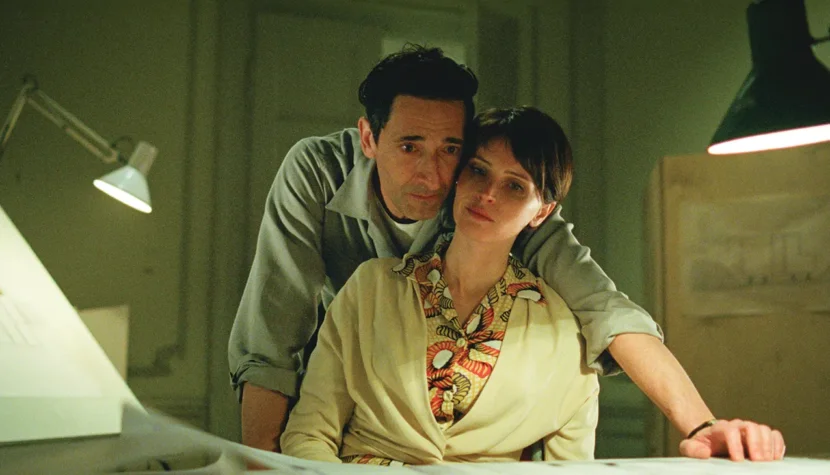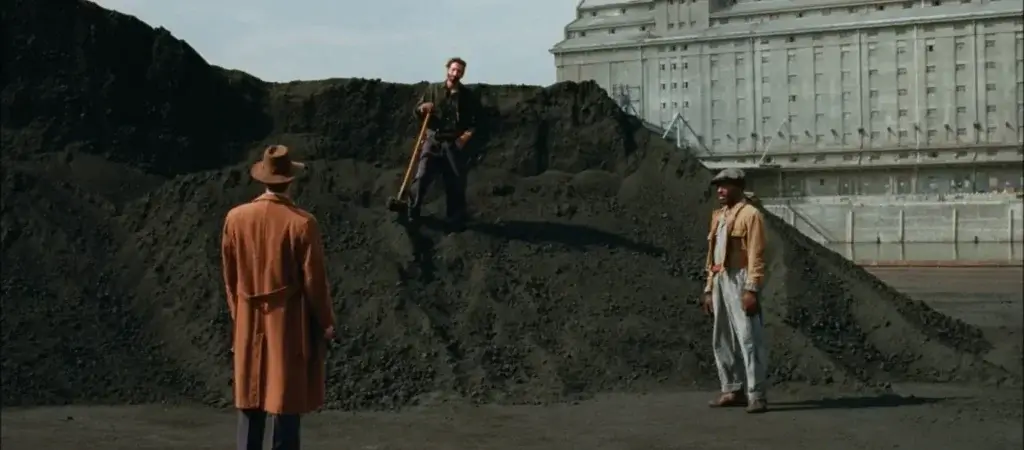THE BRUTALIST. No Country for New Men [REVIEW]

In Venice, they say it’s a monolithic film. And there must be some truth to that, since Brady Corbet’s latest work “The Brutalist” received a 12-minute standing ovation during its premiere.
It’s difficult to write about this film, and there are several reasons for that. First – it’s a 3.5-hour epic about the unfulfilled American dream, which – due to a few unpredictable factors – turns into a tragic snowball, destroying everything in its path. The film even has a 15-minute intermission, dividing it into two distinct but interconnected formal narratives. Second – there’s a lot of content and context, intertwined with unexpected plot twists.

“The Brutalist” deserves a full essay, but let’s try to cover it in this brief review. Corbet’s drama tells the story of a Hungarian Jewish architect, László Toth (an Oscar-worthy performance by Adrien Brody), who emigrates to the United States in 1947 in search of a better life. He has a cousin in America, which theoretically gives him a better start, but it takes some time before his beloved wife (Felicity Jones) can join him. However, his talent catches the eye of an American magnate (an excellent Guy Pearce), who commissions him to build his opus magnum. Our protagonist doesn’t yet realize that the contract he signs will affect his private life and shape what his “American dream” will look like over the next thirty years. Deep down, it’s a life lived in tragic wakefulness; a dream from which there will be no quick awakening. It feels like a lost Steinbeck novella, where each character plays their role in a sequence that eventually affects the final outcome.
The most inspiring aspect seems to be the great comeback of Adrien Brody, who, over the past few years, hasn’t made many good acting choices – a situation similar to Jake Gyllenhaal’s, though Brody’s case isn’t as dire. The 51-year-old convincingly portrays a Jewish architect who, despite his immense talent, bold personality, and charisma, is not taken seriously by his employers. Why? Because he is Jewish – and that’s both all it takes and more than enough. In the eyes of America’s upper classes, Brody’s character and his family belong to that “second category” of people. It’s no surprise that László finds understanding in a Black construction worker who becomes his best friend. Both come from similar social backgrounds and know what it feels like to not be fully taken seriously. World War II may be long over, and racism supposedly should no longer exist, but the world has never been colorful; it remains fixed and black-and-white.

This is why László begins to shed his previous, easygoing nature in favor of a more explosive temperament, molded by capitalist competition and excessive demands. Since he’s treated like proverbial “trash” in a country meant to be the cradle of civilization, László will do whatever it takes to complete his project, creating a monument more enduring than bronze. Only in this way can he prove to others (and to himself) that he is worth something. That his entire culture and tradition still matter and always will.
At none of the festivals in the sacred trinity (outside Venice, Cannes, and Berlin) have we seen such a phenomenon of a film, where practically no negative voices are raised. Let the applause after just the first half of the film speak for itself, with its 15-minute intermission, when all the critics at the press screening began clapping, demanding the second half of this monumental film. Those fifteen minutes felt like an eternity to everyone, and when the final countdown began, the entire room went wild, counting down those last ten seconds out loud.
And this film is exactly that kind of controlled madness, which evolves from subtle details into an outright rollercoaster. Envy, pride, misunderstanding, fear, desire, and personality breakdown – you will find all of these elements in Brady Corbet’s “The Brutalist”. It may very well be a masterpiece. And if not, it is at least a refreshing take on the classic formula of the American epic, one that simply cannot be missed.

